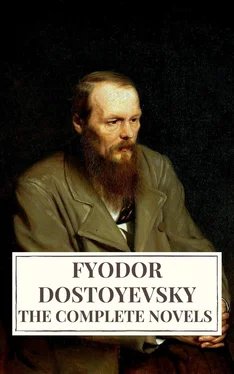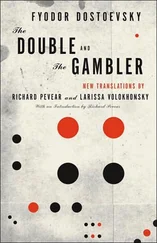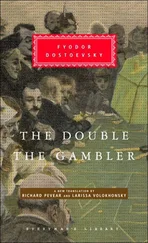Fyodor Dostoevsky - The Complete Novels of Fyodor Dostoyevsky
Здесь есть возможность читать онлайн «Fyodor Dostoevsky - The Complete Novels of Fyodor Dostoyevsky» — ознакомительный отрывок электронной книги совершенно бесплатно, а после прочтения отрывка купить полную версию. В некоторых случаях можно слушать аудио, скачать через торрент в формате fb2 и присутствует краткое содержание. Жанр: unrecognised, на английском языке. Описание произведения, (предисловие) а так же отзывы посетителей доступны на портале библиотеки ЛибКат.
- Название:The Complete Novels of Fyodor Dostoyevsky
- Автор:
- Жанр:
- Год:неизвестен
- ISBN:нет данных
- Рейтинг книги:5 / 5. Голосов: 1
-
Избранное:Добавить в избранное
- Отзывы:
-
Ваша оценка:
- 100
- 1
- 2
- 3
- 4
- 5
The Complete Novels of Fyodor Dostoyevsky: краткое содержание, описание и аннотация
Предлагаем к чтению аннотацию, описание, краткое содержание или предисловие (зависит от того, что написал сам автор книги «The Complete Novels of Fyodor Dostoyevsky»). Если вы не нашли необходимую информацию о книге — напишите в комментариях, мы постараемся отыскать её.
Poor Folk
The Double
Notes From The Underground
Crime and Punishment
The Gambler
The Idiot
The Possessed (The Devils)
A Raw Youth
The Dream of a Ridiculous Man
The Brothers Karamazov
The Complete Novels of Fyodor Dostoyevsky — читать онлайн ознакомительный отрывок
Ниже представлен текст книги, разбитый по страницам. Система сохранения места последней прочитанной страницы, позволяет с удобством читать онлайн бесплатно книгу «The Complete Novels of Fyodor Dostoyevsky», без необходимости каждый раз заново искать на чём Вы остановились. Поставьте закладку, и сможете в любой момент перейти на страницу, на которой закончили чтение.
Интервал:
Закладка:
I chanced to look into the glass. My harassed face struck me as revolting in the extreme, pale, angry, abject, with dishevelled hair. "No matter, I am glad of it," I thought; "I am glad that I shall seem repulsive to her; I like that."
Chapter 6
… Somewhere behind a screen a clock began wheezing, as though oppressed by something, as though someone were strangling it. After an unnaturally prolonged wheezing there followed a shrill, nasty, and as it were unexpectedly rapid, chime—as though someone were suddenly jumping forward. It struck two. I woke up, though I had indeed not been asleep but lying half-conscious.
It was almost completely dark in the narrow, cramped, low-pitched room, cumbered up with an enormous wardrobe and piles of cardboard boxes and all sorts of frippery and litter. The candle end that had been burning on the table was going out and gave a faint flicker from time to time. In a few minutes there would be complete darkness.
I was not long in coming to myself; everything came back to my mind at once, without an effort, as though it had been in ambush to pounce upon me again. And, indeed, even while I was unconscious a point seemed continually to remain in my memory unforgotten, and round it my dreams moved drearily. But strange to say, everything that had happened to me in that day seemed to me now, on waking, to be in the far, far away past, as though I had long, long ago lived all that down.
My head was full of fumes. Something seemed to be hovering over me, rousing me, exciting me, and making me restless. Misery and spite seemed surging up in me again and seeking an outlet. Suddenly I saw beside me two wide open eyes scrutinising me curiously and persistently. The look in those eyes was coldly detached, sullen, as it were utterly remote; it weighed upon me.
A grim idea came into my brain and passed all over my body, as a horrible sensation, such as one feels when one goes into a damp and mouldy cellar. There was something unnatural in those two eyes, beginning to look at me only now. I recalled, too, that during those two hours I had not said a single word to this creature, and had, in fact, considered it utterly superfluous; in fact, the silence had for some reason gratified me. Now I suddenly realised vividly the hideous idea— revolting as a spider—of vice, which, without love, grossly and shamelessly begins with that in which true love finds its consummation. For a long time we gazed at each other like that, but she did not drop her eyes before mine and her expression did not change, so that at last I felt uncomfortable.
"What is your name?" I asked abruptly, to put an end to it.
"Liza," she answered almost in a whisper, but somehow far from graciously, and she turned her eyes away.
I was silent.
"What weather! The snow … it's disgusting!" I said, almost to myself, putting my arm under my head despondently, and gazing at the ceiling.
She made no answer. This was horrible.
"Have you always lived in Petersburg?" I asked a minute later, almost angrily, turning my head slightly towards her.
"No."
"Where do you come from?"
"From Riga," she answered reluctantly.
"Are you a German?"
"No, Russian."
"Have you been here long?"
"Where?"
"In this house?"
"A fortnight."
She spoke more and more jerkily. The candle went out; I could no longer distinguish her face.
"Have you a father and mother?"
"Yes … no … I have."
"Where are they?"
"There … in Riga."
"What are they?"
"Oh, nothing."
"Nothing? Why, what class are they?"
"Tradespeople."
"Have you always lived with them?"
"Yes."
"How old are you?"
"Twenty." "Why did you leave them?"
"Oh, for no reason."
That answer meant "Let me alone; I feel sick, sad."
We were silent.
God knows why I did not go away. I felt myself more and more sick and dreary. The images of the previous day began of themselves, apart from my will, flitting through my memory in confusion. I suddenly recalled something I had seen that morning when, full of anxious thoughts, I was hurrying to the office.
"I saw them carrying a coffin out yesterday and they nearly dropped it," I suddenly said aloud, not that I desired to open the conversation, but as it were by accident.
"A coffin?"
"Yes, in the Haymarket; they were bringing it up out of a cellar."
"From a cellar?"
"Not from a cellar, but a basement. Oh, you know … down below … from a house of ill-fame. It was filthy all round … Egg-shells, litter … a stench. It was loathsome."
Silence.
"A nasty day to be buried," I began, simply to avoid being silent.
"Nasty, in what way?"
"The snow, the wet." (I yawned.)
"It makes no difference," she said suddenly, after a brief silence.
"No, it's horrid." (I yawned again). "The gravediggers must have sworn at getting drenched by the snow. And there must have been water in the grave."
"Why water in the grave?" she asked, with a sort of curiosity, but speaking even more harshly and abruptly than before.
I suddenly began to feel provoked.
"Why, there must have been water at the bottom a foot deep. You can't dig a dry grave in Volkovo Cemetery."
"Why?"
"Why? Why, the place is waterlogged. It's a regular marsh. So they bury them in water. I've seen it myself … many times."
(I had never seen it once, indeed I had never been in Volkovo, and had only heard stories of it.)
"Do you mean to say, you don't mind how you die?"
"But why should I die?" she answered, as though defending herself.
"Why, some day you will die, and you will die just the same as that dead woman. She was … a girl like you. She died of consumption."
"A wench would have died in hospital … " (She knows all about it already: she said "wench," not "girl.")
"She was in debt to her madam," I retorted, more and more provoked by the discussion; "and went on earning money for her up to the end, though she was in consumption. Some sledge-drivers standing by were talking about her to some soldiers and telling them so. No doubt they knew her. They were laughing. They were going to meet in a pot-house to drink to her memory."
A great deal of this was my invention. Silence followed, profound silence. She did not stir.
"And is it better to die in a hospital?"
"Isn't it just the same? Besides, why should I die?" she added irritably.
"If not now, a little later."
"Why a little later?"
"Why, indeed? Now you are young, pretty, fresh, you fetch a high price. But after another year of this life you will be very different—you will go off."
"In a year?"
"Anyway, in a year you will be worth less," I continued malignantly. "You will go from here to something lower, another house; a year later— to a third, lower and lower, and in seven years you will come to a basement in the Haymarket. That will be if you were lucky. But it would be much worse if you got some disease, consumption, say … and caught a chill, or something or other. It's not easy to get over an illness in your way of life. If you catch anything you may not get rid of it. And so you would die."
"Oh, well, then I shall die," she answered, quite vindictively, and she made a quick movement.
"But one is sorry."
"Sorry for whom?"
"Sorry for life." Silence.
"Have you been engaged to be married? Eh?"
"What's that to you?"
"Oh, I am not cross-examining you. It's nothing to me. Why are you so cross? Of course you may have had your own troubles. What is it to me? It's simply that I felt sorry."
"Sorry for whom?"
"Sorry for you."
"No need," she whispered hardly audibly, and again made a faint movement.
That incensed me at once. What! I was so gentle with her, and she … .
Читать дальшеИнтервал:
Закладка:
Похожие книги на «The Complete Novels of Fyodor Dostoyevsky»
Представляем Вашему вниманию похожие книги на «The Complete Novels of Fyodor Dostoyevsky» списком для выбора. Мы отобрали схожую по названию и смыслу литературу в надежде предоставить читателям больше вариантов отыскать новые, интересные, ещё непрочитанные произведения.
Обсуждение, отзывы о книге «The Complete Novels of Fyodor Dostoyevsky» и просто собственные мнения читателей. Оставьте ваши комментарии, напишите, что Вы думаете о произведении, его смысле или главных героях. Укажите что конкретно понравилось, а что нет, и почему Вы так считаете.












